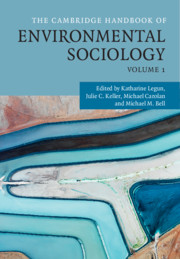Book contents
- The Cambridge Handbook of Environmental Sociology Volume 1
- The Cambridge Handbook of Environmental Sociology
- Copyright page
- Contents
- Figures
- Tables
- Contributors
- Foreword
- Introduction
- Part I Theory in Environmental Sociology
- Part II The Economy and Environmental Sociology
- Part III Culture and Environmental Sociology
- Part IV Politics, Power, State
- Part V Social Justice
- 24 Expanding Critical and Radical Approaches to Environmental Justice
- 25 Development Strategies and Environmental Inequalities in Brazil
- 26 Rural Estrangement: Roadblocks and Roundabouts to Justice
- 27 Environmental Justice and Capitalism
- 28 Ecological Economics and Environmental Sociology: A Social Power Structures Approach to Environmental Justice in Economic Systems
- Index
- References
27 - Environmental Justice and Capitalism
from Part V - Social Justice
Published online by Cambridge University Press: 05 November 2020
- The Cambridge Handbook of Environmental Sociology Volume 1
- The Cambridge Handbook of Environmental Sociology
- Copyright page
- Contents
- Figures
- Tables
- Contributors
- Foreword
- Introduction
- Part I Theory in Environmental Sociology
- Part II The Economy and Environmental Sociology
- Part III Culture and Environmental Sociology
- Part IV Politics, Power, State
- Part V Social Justice
- 24 Expanding Critical and Radical Approaches to Environmental Justice
- 25 Development Strategies and Environmental Inequalities in Brazil
- 26 Rural Estrangement: Roadblocks and Roundabouts to Justice
- 27 Environmental Justice and Capitalism
- 28 Ecological Economics and Environmental Sociology: A Social Power Structures Approach to Environmental Justice in Economic Systems
- Index
- References
Summary
In this chapter, I link environmental sociology scholarship on capitalism and environment to research on environmental justice more specifically. Critical environmental sociology holds that capitalism is predicated on inequalities and that capitalist production and consumption practices create negative environmental consequences.Because these features are fundamental to capitalism, environmental injustices are almost certain to occur.I make the case that capitalism is not necessarily reformable via technological advances and government actions, as suggested by ecological modernization proponents.Government policies often support business and growth and have thus far failed to adequately address environmental inequities. I suggest that critical sociologists should continue to uncover and investigate the legal and financial structures from which corporate actors derive power and continue to demand changes to current economic structures.
- Type
- Chapter
- Information
- The Cambridge Handbook of Environmental Sociology , pp. 452 - 469Publisher: Cambridge University PressPrint publication year: 2020

